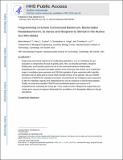| dc.contributor.author | Tucker, Alex C. | |
| dc.contributor.author | Voigt, Christopher A. | |
| dc.contributor.author | Lu, Timothy K | |
| dc.contributor.author | Mimee, Mark Kyle | |
| dc.date.accessioned | 2017-03-09T19:52:36Z | |
| dc.date.available | 2017-03-09T19:52:36Z | |
| dc.date.issued | 2015-07 | |
| dc.date.submitted | 2015-05 | |
| dc.identifier.issn | 2405-4712 | |
| dc.identifier.uri | http://hdl.handle.net/1721.1/107264 | |
| dc.description.abstract | Engineering commensal organisms for challenging applications, such as modulating the gut ecosystem, is hampered by the lack of genetic parts. Here, we describe promoters, ribosome-binding sites, and inducible systems for use in the commensal bacterium Bacteroides thetaiotaomicron, a prevalent and stable resident of the human gut. We achieve up to 10,000-fold range in constitutive gene expression and 100-fold regulation of gene expression with inducible promoters and use these parts to record DNA-encoded memory in the genome. We use CRISPR interference (CRISPRi) for regulated knockdown of recombinant and endogenous gene expression to alter the metabolic capacity of B. thetaiotaomicron and its resistance to antimicrobial peptides. Finally, we show that inducible CRISPRi and recombinase systems can function in B. thetaiotaomicron colonizing the mouse gut. These results provide a blueprint for engineering new chassis and a resource to engineer Bacteroides for surveillance of or therapeutic delivery to the gut microbiome. | en_US |
| dc.description.sponsorship | National Science Foundation (U.S.) (Grant EEC-0540879) | en_US |
| dc.description.sponsorship | National Institutes of Health (U.S.) (Grants P50GM098792, 1DP2OD008435, 1R01EB017755, and GM095765) | en_US |
| dc.description.sponsorship | United States. Defense Advanced Research Projects Agency (Grant CLIO N66001-12-C-4016) | en_US |
| dc.description.sponsorship | United States. Defense Threat Reduction Agency (Grant HDTRA1-14-1-0007) | en_US |
| dc.description.sponsorship | United States. Office of Naval Research (Grant N00014-13-1-0424) | en_US |
| dc.description.sponsorship | Massachusetts Institute of Technology. Center for Microbiome Informatics and Therapeutics | en_US |
| dc.description.sponsorship | QUALCOMM Inc. (Innovation Fellowship) | en_US |
| dc.language.iso | en_US | |
| dc.publisher | Elsevier | en_US |
| dc.relation.isversionof | http://dx.doi.org/10.1016/j.cels.2015.06.001 | en_US |
| dc.rights | Creative Commons Attribution-NonCommercial-NoDerivs License | en_US |
| dc.rights.uri | http://creativecommons.org/licenses/by-nc-nd/4.0/ | en_US |
| dc.source | PMC | en_US |
| dc.title | Programming a Human Commensal Bacterium, Bacteroides thetaiotaomicron, to Sense and Respond to Stimuli in the Murine Gut Microbiota | en_US |
| dc.type | Article | en_US |
| dc.identifier.citation | Mimee, Mark et al. “Programming a Human Commensal Bacterium, Bacteroides Thetaiotaomicron, to Sense and Respond to Stimuli in the Murine Gut Microbiota.” Cell Systems 1.1 (2015): 62–71. | en_US |
| dc.contributor.department | Massachusetts Institute of Technology. Department of Biological Engineering | en_US |
| dc.contributor.department | Massachusetts Institute of Technology. Department of Biology | en_US |
| dc.contributor.department | Massachusetts Institute of Technology. Department of Electrical Engineering and Computer Science | en_US |
| dc.contributor.mitauthor | Mimee, Mark K | |
| dc.contributor.mitauthor | Tucker, Alex C. | |
| dc.contributor.mitauthor | Voigt, Christopher A. | |
| dc.contributor.mitauthor | Lu, Timothy K | |
| dc.relation.journal | Cell Systems | en_US |
| dc.eprint.version | Author's final manuscript | en_US |
| dc.type.uri | http://purl.org/eprint/type/JournalArticle | en_US |
| eprint.status | http://purl.org/eprint/status/PeerReviewed | en_US |
| dspace.orderedauthors | Mimee, Mark; Tucker, Alex C.; Voigt, Christopher A.; Lu, Timothy K. | en_US |
| dspace.embargo.terms | N | en_US |
| dc.identifier.orcid | https://orcid.org/0000-0002-3083-2671 | |
| dc.identifier.orcid | https://orcid.org/0000-0003-0844-4776 | |
| dc.identifier.orcid | https://orcid.org/0000-0002-9999-6690 | |
| mit.license | PUBLISHER_CC | en_US |
